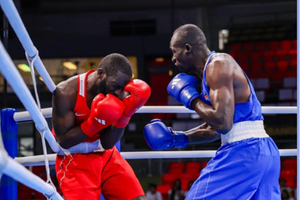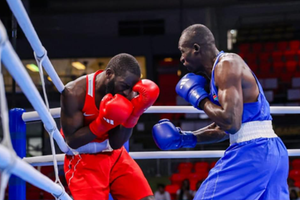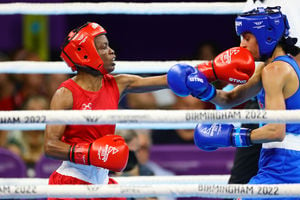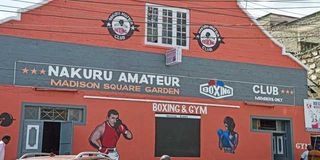
The entrance of the Nakuru Amateur Boxing Club popularly known as Madison Square Garden in Nakuru City in the photo taken on May 31, 2024.
The death of Kenyan boxing has coincided with decline of boxing clubs that used to nurture talent for the national teams. At the moment, not a single Kenyan boxer has qualified for the 2024 Olympic Games, pointing to the gradual but steady decline of the sport in the last 60 years.
Kenyan boxers have failed to qualify for the July 26 to August 11 Olympics in three successive attempts, first at the September 9 to 23 African qualifiers in Dakar, followed by the first World Qualification Tournament in Busto Arsizio, Italy, from March 3 to 11, and in the second World Boxing Qualification Tournament in Bangkok from May 24 to June 2.
For the first time since Kenya competed in the Olympic Games as an independent country at the 1964 Tokyo Olympics, Kenya will not send a single boxer to the Olympics.
As far as nurturing boxing talent in Kenya is concerned, Nakuru Amateur Boxing Club, popularly known as ‘Madison Square Garden’, takes pride of place. Boxers, among them the legendary Philip Waruinge who was the first boxer to win an Olympics medal in boxing for Kenya, nurtured their talents at the ‘Madison Square Garden’. Waruinge claimed bronze medal in featherweight category at the 1964 Olympic Games, which was the inaugural Olympic outing for Kenya. However, boxing activities at Nakuru Amateur Boxing Club are nearly grinding to a halt.
National boxing team
Since 1964, Nakuru Amateur Boxing Club has contributed at least two boxers to the national boxing team ‘Hit Squad’ that competed at the Summer Olympics. However, for more than 10 years now, the 64-year-old club that was once regarded the talent factory for boxing in Kenya, has not supplied a single boxer to the national team.
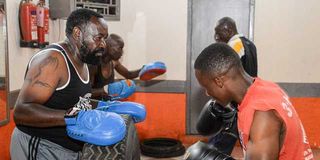
Nakuru Amateur Boxing Club's deputy head coach, Joseph Gatua trains boxers at the club on Friday, May 31, 2024.
In the past, the club boasted a rich pool of boxing stars who captivated the public imagination in the cosmopolitan city of Nakuru. Apart from Waruinge, other boxers who wowed fans with theiur performances, and also possessed a magnetic personality that saw them win international fights include Francis Mbagara, Sammy Mbugua, Peter Munene, John Kamau, John Nderu, Dick Gicheya, Gabriel Kinyua, Peter Morris, Alex Gathumbi, and George Findo.
Also on the list are John Gichangi, John “Duran” Wanjau, Isaiah Ikhoni, John “Poison” Kamau, Daniel Mwangi, Peter Wanyoike, Peter “Dynamite “Odhiambo, Chris “Kawasaki” Kariuki, Ben Munga, Fred Kuria, Sammy Kipkemoi, Joseph “Don King” Muthoga, among others.
These boxers attracted fans from all walks of life, and made Madison Square Garden a lively place.
But in recent years, the club has struggled to produce talented and marketable boxers.
Today, the club, which previously was a motor vehicle garage before it was converted into a boxing club by British soldier Maxie MacCllough, is no longer scouting raw talent.
The club’s new officials, led by chairman Nderitu Kahihu, have improved part of the infrastructure, but it is gaining popularity as a leisure club rather than a boxing club.
The club is today a preferred meeting point for groups of small-scale traders from Nakuru City, and fitness enthusiasts who love going to the gym. It has also opened a hotel segment for members as an income-generating venture, and a bar.
Support boxing
“The founder of the club, Maxie, had a vision that the proceeds from the bar counter would be used to support boxing, and to buy playing kits,” the club’s former head coach Mwangi “Carlos” Muthee, told Nation Sport.
Muthee members a time when he was forced to reach out to a friend who had a pair of basketball playing kits to bail out boxers at the club as there was no kit.
The club has no qualified coach to handle newcomers after Muthee was forced to step aside by the new management.
Boxers at the club are now handled by Juma Camlus, assisted by Joseph Gatua. Both coaches have no formal training.
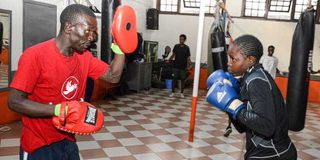
Nakuru Amateur Boxing Club’s head coach, Juma Camlus (left) and budding boxer Selina Osachi in training at the club, popularly known as ‘Madison Square Garden’ on Friday.
“The club still depends on individuals to bail it out when it is in dire need. We need collective support from the members to uplift the declining standards of boxing in Nakuru,” said Camlus.
“To compete in a three-day tournament, we need more than Sh50,000. We also need ring boots and training kit, sparring materials like head gears, gum sheet and gloves,” said Camlus.
Coach Muthee’s departure means the club is no longer in a position to showcase boxing talent.
“The new management of the club may have the final say on who should be the head coach, but it is risky to have an untrained person working as head coach. That can be dangerous because the sport of boxing inherently carries a risk of injury and it is only a qualified coach who can monitor such injuries in the ring and during training sessions,” Muthee said.
“The decline of boxing at the club can also be attributed to competing interests at the club as boxing is not given enough the attention it deserves. This has led to diluted talent pools and confusion among boxers,” the veteran coach said.
Cohesive structure
He said the lack of a cohesive structure and unified approach to promoting boxing has made it challenging to sustain long-term interest and discover new talents.
“The founder of the club had a vision that the profits accrued from the bar counter at the club, part of the profits should be used to promote boxing at the club,” said Muthee.
“The club needs a solid financial base to send boxers to local tournaments. As head coach, it has been a tough job training talents with no financial support,” added Muthee.
At some point, well-wishers donated gloves and other training gear to Muthee’s boxers.

Former international boxer Philip Waruinge, the only Kenyan boxer to win two medals in two Olympics, after the fourth leg of the SportsPesa national boxing league at Madison Square Garden in Nakuru on October 21, 2017.
“The club used to pay for our accommodation, but the boys were not paid any subsistence allowance and this killed their morale,” he added.
“My boxers were self-employed. Some were porters and when you take them out of town for two days for a tournament without allowances, it is bound to have a repercussions, which translate to absconding training,” Muthee explains.
The Hungary-trained coach is credited with producing world-class boxers like Peter Wanyoike (middleweight) who won a silver medal in the Zone Five championship in Egypt in 1989, and a bronze medal at the 1994 Commonwealth Games in Victoria Canada. Muthee also produced champions like Sammy Magima (flyweight), Mary “Dragon” Muthoni (lightweight), John “Koki” Kariuki (lightweight), Tom Waruinge (flyweight), Khatib Ali (lightweight), among others.
Budding boxers trooped to the ‘Madison Square Garden’ to get employment with companies like East Africa Breweries, Telkom Kenya, Rivatex, and county governments as well as the discipline forces like Kenya Defence Forces (KDF), Kenya Prisons and Kenya Police.
“With no job opportunities, the number of new entrants has reduced, and subsequently impacted on the talent pipeline,” said coach Muthee.
Former boxer Peter “Dynamite” Odhiambo who competed at the 1996 Atlanta Olympic Gamesreckons that lack of exposure to boxers at school is contributing to the decline of boxing at the club.
Punching the bags
“The current crop of boxers taking up the sport consider many factors, not just punching the bags. They want to be assured of jobs and other opportunities to put food on the table,” said Odhiambo.
Odhiambo says lack of qualified coaches handling boxers at the club may create half-baked boxers.
“We have coaches at the club who have no basic training in the game and this is killing boxing in Nakuru City and beyond,” he says.
“Boxing is not taken seriously by the club’s members, and that is why they are hiring unqualified coaches. This is not fair to emerging boxers who want to exploit their talents,” said Odhiambo.
However, the club’s chairman, Kahihu, said the new leadership is determined to revamp boxing at the famous club.
“We are doing well and we have just started to change boxing face for the better and we shall improve it,” said Kahihu.

